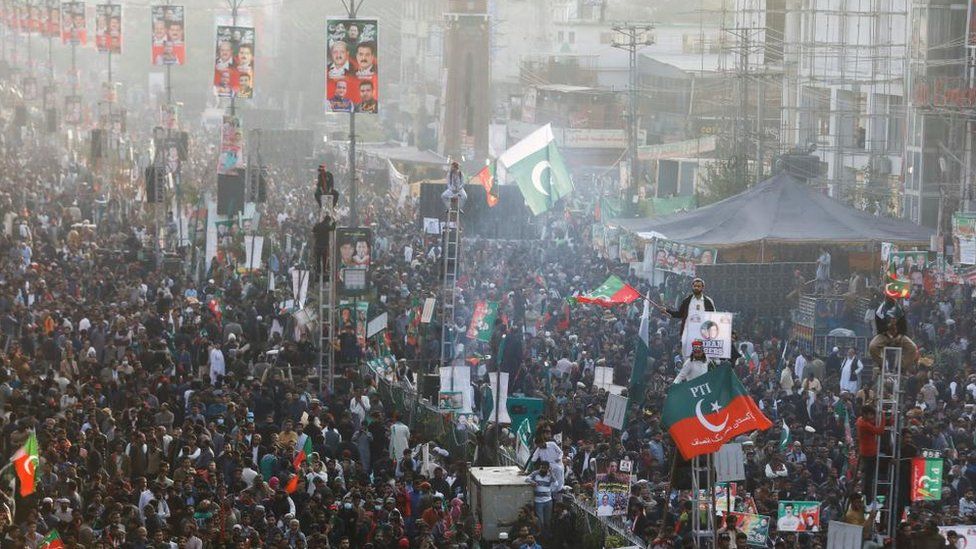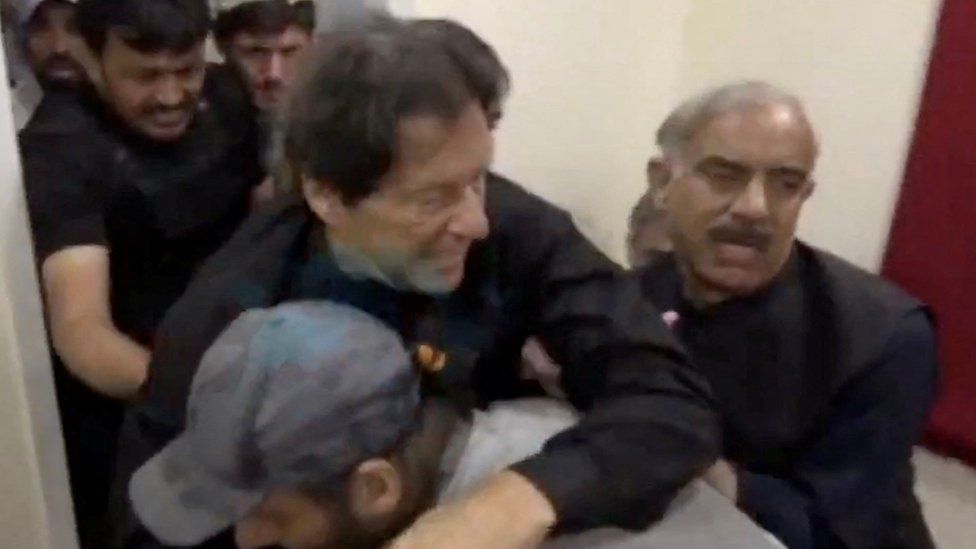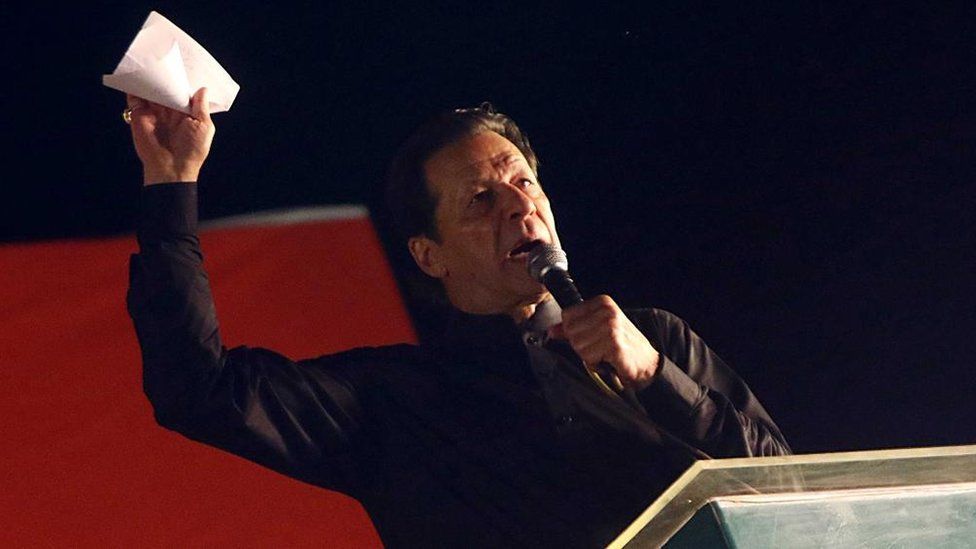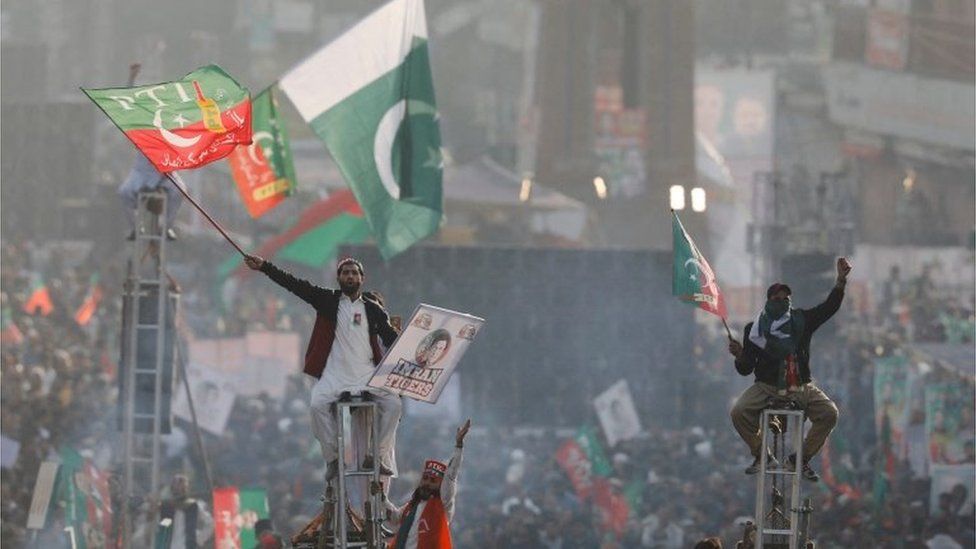
Pakistan’s former prime minister, Imran Khan, is threatening to dissolve two provincial assemblies in a high-stakes attempt to force the federal government to hold early elections.
The dissolution of legislatures controlled by his party in Punjab and Khyber Pakhtunkhwa is set for 23 December, about a year before elections are due.
“For all the intense politicking and instability in Pakistan’s politics over the years, nothing like this has happened before in Pakistan,” says Madiha Afzal, a fellow with the Washington-based Brookings Institute think tank and the author of Pakistan Under Siege: Extremism, Society and the State.
Mr Khan’s move threatens to plunge Pakistan, already struggling with financial crisis, even deeper into political turmoil at a time when some say it can least afford it.
It comes at the end of a tumultuous year for the cricket hero-turned-politician, who was ousted as prime minister in April and injured in a shooting in November.
This video can not be played
To play this video you need to enable JavaScript in your browser.
Although Imran Khan is no longer in office, the fact his Tehreek-e-Insaaf (PTI) party is in control of two of Pakistan’s four provinces means he still pulls some strings.
But it’s far from certain his latest pressure tactic will work.
Since he became the first PM in Pakistan’s history to lose a parliamentary vote of no confidence, Mr Khan has demanded the electorate have their say.
He has held a series of high-profile rallies in an attempt to force the coalition government that replaced him to call early elections – a demand it has repeatedly said it would not heed.
Pakistan’s constitution says a vote must be held 90 days after dissolution. What will actually happen is unclear.
Madiha Afzal believes the courts are likely to be involved in some way.
“If Khan’s move on Friday is successful, and that’s a big if at this point, the PDM have indicated that they will hold provincial assembly elections and not general elections. Therefore Khan’s move, even if successful, is not likely to force early general elections, his goal.”
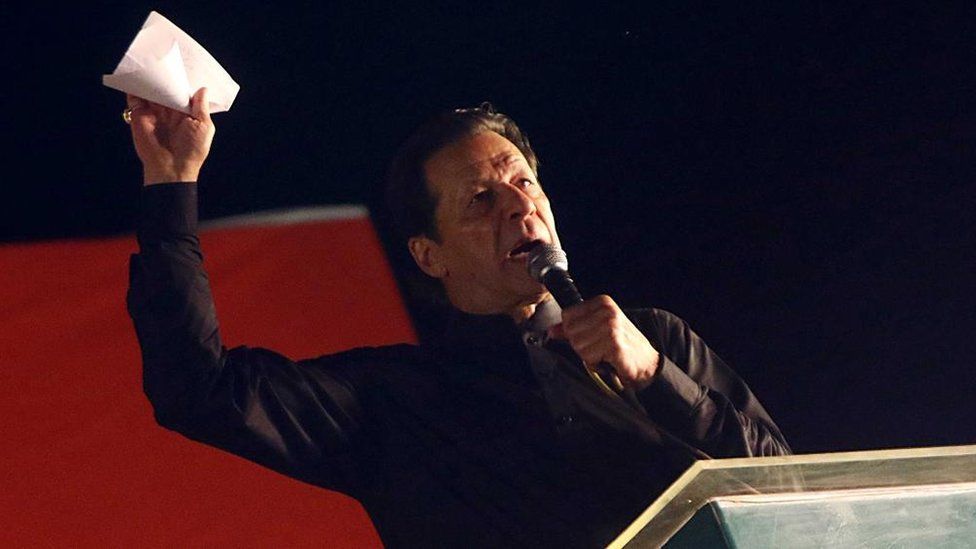
Akbar S Babar, a founding member of Mr Khan’s PTI party who has now fallen out with him, is critical of his repeated calls for an early election, saying he is simply power-hungry and creating political instability at a time when the country needs the opposite.
“He’s really created a situation in Pakistan that can go in any direction. He is forcing strife on society. This is not the role of a politician. This is not the role of a nation-builder.”
Imran Khan disagrees, saying he is still fighting for the good of the country. He told the BBC he is a democrat – and “democrats always go to the people”.
“I’ve been in politics for 26 years – never in Pakistan’s history has a party had so much public support as [we have] now.”
It’s true – Mr Khan, who is 70, remains popular. In recent by-elections, his party won six of the eight seats up for grabs.
The most recent rallies by Mr Khan and his PTI, which they have billed as “the long march”, were intended to be a visible demonstration of his popularity.
Beginning in Lahore, a caravan of protesters were making their way to the capital, Islamabad, to stage a sit-in to put pressure on the government.
It was while Mr Khan was appearing at a protest march in Wazirabad on 3 November – two days after the BBC interview – that a gunman opened fire on his convoy, hitting him in the leg. One person was killed and several others injured.
The former PM has accused members of the current government of plotting the attack.
Authorities have rejected the accusation and released a video purporting to show a confession from a man they describe as the only suspect in the shooting.
Mr Khan’s list of accomplishments during his time as prime minister are slim. The country’s economy was plunged into a financial crisis. His reforms to the education system to create a unified curriculum were delayed.
He managed to get more citizens to pay income taxes, but was unable to get wealthy Pakistanis to pay a greater share.
“His governance was not very good, his governance was not exemplary,” says Sohail Warraich, editor of the Urdu-language newspaper The Daily Jang.
When he was elected in July 2018, Imran Khan campaigned on the promise of change, stressing that he wasn’t part of the political dynasties that had controlled Pakistan since the country’s inception 75 years ago.
He also promised to move away from the dishonest practices of previous governments – but he too is now accused of corruption.
In October, the election commission barred him from standing for political office for five years for incorrectly declaring details of presents from foreign dignitaries and proceeds from their alleged sale. Mr Khan described the case as politically motived.
“That’s when I realised he was part of the problem and not part of the solution,” says Akbar S Babar.
“He was never anchored in any [political] ideology. He’s basically a celebrity who is looking for more fame. If Imran ever comes back into power, and I seriously doubt he will, God help Pakistan.”
Sahibzada Jahangir, also a founding member of the PTI, has been friends with Mr Khan for 50 years and remains an ardent supporter.
He believes fresh elections are imminent – and he says Mr Khan will win.
“We have a very, very corrupt system. And Imran is standing alone against that system,” he told the BBC.
“They want him down. They tried assassination on him. Because he is one man that is disturbing the system that has existed for the last 75 years.”
But Sohail Warraich thinks a return to office for Imran Khan is a distant prospect.
“Though he has the political power, he is not making an effort to reconcile with the institutions. And if he has this hostility and it continues, I don’t think there will be an easy way to power.”
-
-
3 November
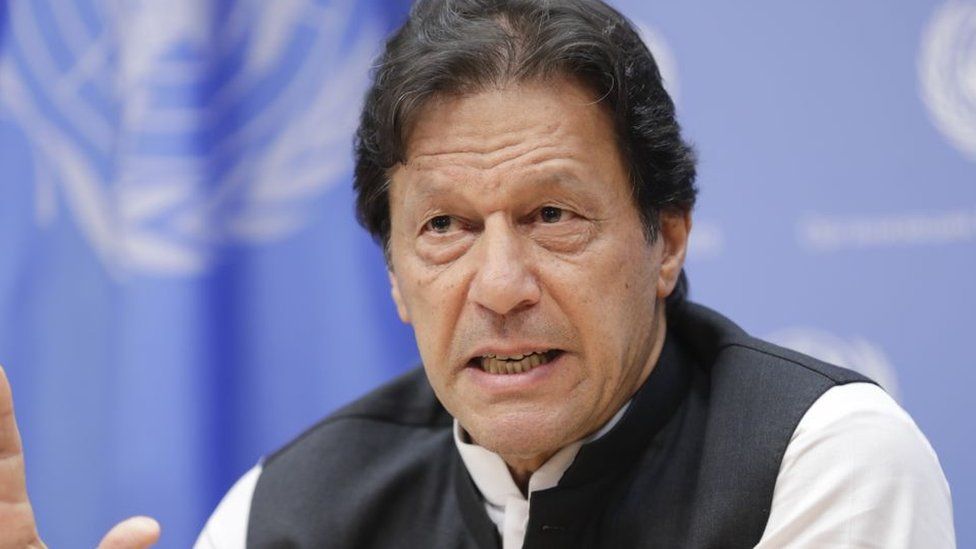
-

